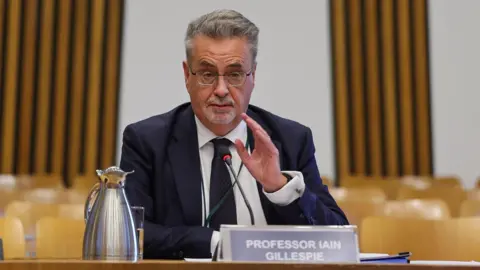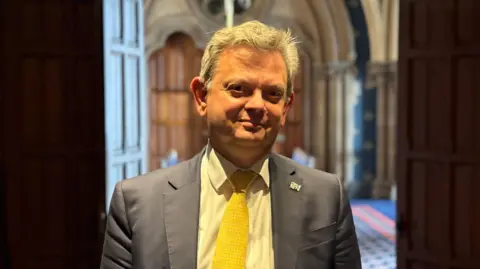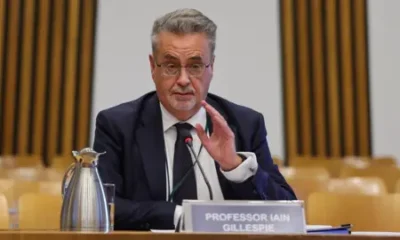Other News
Germany updates: Merz addresses Bundestag on budget

Read more on post.
09/24/2025September 24, 2025
Merz urges swift reforms amid economic slump
Chancellor Friedrich Merz has called for deep reforms to counter Germany’s economic slowdown and global instability, telling the Bundestag on Wednesday that the country faces one of the most challenging periods in its modern history.
“The entire Western community of values is facing perhaps its greatest test,” the conservative Christian Democrat leader said during the debate on the 2026 federal budget, warning that Germany’s export-driven economy depends on an open, rules-based world order.
“Only a growth-oriented economy generates the resources we need to fund infrastructure, show solidarity and ensure lasting social security,” Merz said, adding that unions and employers alike are deeply worried about jobs and investment. “That is why we must act, and act quickly.”
Merz skipped the UN General Assembly in New York to attend the budget session, which follows last week’s debate on the 2025 spending plan.
https://p.dw.com/p/50zBa
09/24/2025September 24, 2025
AfD attacks government over debt in budget debate
The co-chair of the far-right Alternative for Germany (AfD), Tino Chrupalla, has accused the German government of pursuing a “debt binge,” citing planned new borrowing of about €174 billion next year.
“You are recklessly wasting the capital of future generations,” Chrupalla said as he opened the Bundestag’s general debate on the chancellery’s budget, the first time he has led the opposition response in this session.
Chrupalla criticized high energy prices, the tax and levy burden, and spending on climate protection and the citizens’ benefit programs,as well as arguing that migration costs primarily strain the social welfare system.
His co-chair, Alice Weidel, led the opposition remarks during last week’s debate on the current-year budget.
https://p.dw.com/p/50z6I
09/24/2025September 24, 2025
Merz to speak at budget debate, not UN
While other world leaders address the United Nations General Assembly, German Chancellor Friedrich Merz is speaking as part of the Bundestag’s deliberations on Germany’s 2026 federal budget.
Leaders of the other parliamentary groups also plan to take the floor as part of the general debate, which is traditionally used for a broad confrontation over the federal government’s policies as a whole.
Later in the day, the individual budgets for the foreign, defense and development ministries are scheduled.
The budget debate began on Tuesday with the presentation of the draft by Federal Finance Minister Lars Klingbeil from the center-left Social Democrats.
Another general debate in the Bundestag took place only last week. The focus then was still on the 2025 federal budget, which had been delayed because of Germany’s February election.
The Green Party on Tuesday criticized Merz for staying in Germany as the General Assembly opens in New York, where about 150 world leaders are gathering this week.
Foreign Minister Johann Wadephul is representing Berlin as Merz instead focuses on the federal budget week and a key constitutional court election in the Bundestag.
https://p.dw.com/p/50z2Z
09/24/2025September 24, 2025
Court to rule on accident pension for TV stunt performer
Nearly 15 years after his on-air accident, Germany’s Federal Social Court is set to decide whether actor Samuel Koch qualifies for a statutory accident pension.
Koch, then 23, was paralyzed during the December 2010 live broadcast of “Wetten, dass..?” when he attempted to leap over five moving cars on spring stilts and struck the fourth vehicle, driven by his father.
The show’s format was the basis for the British show “You Bet!” and the American show “Wanna Bet?”
Now 37, Koch applied in 2020 for an accident pension, arguing he was volunteering for a public broadcaster. A lower court rejected the claim, finding that he organized the stunt himself for personal publicity rather than as part of a public-service role.
https://p.dw.com/p/50z60
Welcome to our coverage
Guten Tag from the DW newsroom in Bonn.
You join us with German Chancellor Friedrich Merz skipping the UN spotlight to spar at home over Germany’s 2026 budget.
The chancellor is set to face off with party leaders in the Bundestag’s big general debate before lawmakers dive into the foreign, defense and development budgets.
The opposition Green Party has grumbled about Merz’s absence from the general assembly in New York, where Foreign Minister Johann Wadephul is representing Germany — returning to New York after flying to Berlin for the budget debate.
https://p.dw.com/p/50z5M
Other News
More must be done to protect clean air in Ireland – EPA
Other News
Martin spoke (briefly) to Trump at a world leaders banquet last night and they chatted about golf
Breaking News
University boss calls for major review of Scottish higher education

Read more on post.
Douglas FraserBusiness/economy editor, Scotland
 BBC
BBCScotland’s most experienced university principal has called for a review of the funding and shape of higher education, warning against “stumbling from year to year”.
Sir Anton Muscatelli, who retires this month after 16 years as the principal and vice-chancellor of Glasgow University, says universities need a plan which could see major changes in the courses they teach and the research they carry out.
He told the BBC that charging tuition fees to Scottish students is unlikely to secure support at Holyrood so Scotland needs to work out what it wants from higher education and then decide how to pay for it.
His call comes ahead of two crucial reports, due to be published on Friday by the Scottish Funding Council (SFC), about the financial position of universities and of further education colleges.
Both studies have been delayed since early this year – and should reflect the latest financial figures up to June.
This comes as analysis seen by the BBC suggests Scottish government finance for universities and further education colleges has been squeezed in real terms in the past six years by about a fifth.
FE colleges say they are having to turn away qualified applicants and that apprenticeship course are over-subscribed, while universities are limiting the number of places they can offer Scottish students.
In recent years, some have subsidised the cost of educating Scottish students by sharply increasing their recruitment of foreign students but those numbers have started to decline.
Are Scotland’s universities in crisis?
Earlier this year, Dundee University was hit by a severe financial crisis.
A report into the near-collapse of the university said it had continued with increased spending despite a drop in foreign student fee income.
Its principal went before a Scottish Parliament committee and admitted incompetence and senior board members resigned over the mismanagement.
Dundee has so far required a Scottish government bailout of more than £40m.
It is an extreme example but other Scottish universities are also under financial strain.
Edinburgh University is planning cuts of £140m, including job losses.
Its principal, Sir Peter Matheson, has called for a “radical re-wiring” to respond to the funding challenge.
Both institutions and others have seen recent strikes by academic staff to highlight the effect of cuts.
Where do universities get their money from?
Students at Scottish universities with permanent homes in Scotland don’t pay tuition fees.
Instead, the universities get money from the government for a set number of Scottish students each year.
However, they claim that the amount they receive does not cover their costs – and in most cases is not as much as the £9,500 a year that students from the rest of the UK usually pay.
Foreign students in Scotland pay much higher fees – in many cases nearly three times more than UK students.
Most of them come to the UK to do post-graduate Masters degree courses.
This has been an area that has provided a welcome source of funding in recent years but it has fallen away sharply for several reasons, including new UK immigration rules and competition from other countries.
There is no sign of Holyrood ministers or their opponents moving to end ‘free tuition’ for Scottish students, so they need to find other ways of tackling their financial problems.
Do universities get enough money for Scottish students?
The BBC has had access to a new study carried out by David Bell, a professor of economics at Stirling University and expert in public finance.
The study, written for the Royal Society of Edinburgh, details how funding per Scottish university student has fallen over the past five years due to the effect of inflation.
In real terms, the funding shrunk by 22% between 2019-20 and 2023-24, Prof Bell says.
The academic also used publicly available data to show that the fees universities receive fall far short of what they estimate are the costs of educating students.
For instance, in modern languages, the £7,421 annual funding per student is half of what they say is required.
In dentistry, the Scottish government last year paid £19,580 per student.
This is reckoned to be at least £9,000 short of the cost to universities.
The funding for veterinary studies, law, social work, media studies, drama, architecture, planning, anatomy, chemistry, mineral engineering, philosophy and religion would have to be increased by at least 70% to reach the actual cost of educating the average student, Prof Bell says.
Universities also say their research funding, from governments and other sources, fails to cover costs of the overheads they have in facilities.
Are universities relying too much on foreign students?
The number of foreign students at Scottish universities has nearly doubled since 2006-07, when it was 24,200.
The figure reached a peak of 47,700 in 2022-23 before falling back.
Prof Bell’s report details the ways in which the money from overseas students is threatened by changes to immigration requirements.
There are new rules that bar students from bringing their families, as well as a reduction in the time foreign nationals are allowed to work in the UK after graduating.
Some universities are much more exposed than others to volatile foreign student income.
The University of the West of Scotland and Glasgow Caledonian have three quarters of the places on their taught post-grad courses filled by non-UK students.
Older universities such as Glasgow and Edinburgh have many more such students, and more than half of whom are from overseas.
What about Scottish students?
 Getty Images
Getty ImagesThe number of places for Scottish students doing their first degree is capped in each university, due to constraints in Scottish government funding.
But there is no limit to the number of places that can be taken by students from the rest of the UK.
They pay the same level of annual tuition fees that they would pay in the rest of the UK.
For the new academic year, that is £9,535, a rise of of 3.1%.
Universities across the UK say this amount has not increased by very much for more than a decade and claim that it also falls short of the actual cost of educating students.
Universities such as Edinburgh and St Andrews have almost as many students from England, Wales and Northern Ireland as they do from Scotland, with roughly a third from each.
Glasgow, by contrast, is 66% Scottish and 15% are from the rest of the UK.
For newer universities, with less of a reputation and prestige, income from the rest of the UK students is more limited.
At Glasgow Caledonian and the University of the Highlands and Islands, the Scottish share is more than 95%.
Do graduates still earn more?
One effect of the Scottish government providing tuition fees for students from Scotland is that graduates themselves leave university with much less debt.
The study cites research that indicates the average Scot graduated in 2023 with debt of £15,430, while the figure for the rest of the UK was £44,940.
Prof Bell’s research gives extensive detail on earnings five years after they graduate.
His figures, based on the 2021-22 tax year, vary widely.
They show a computing graduate from St Andrews was earning an average £77,000, three times as much as one from the University of the West of Scotland.
The lowest pay was for a typical graduate in art and design from the University of the Highlands and Islands, on £15,300.
Other high-earning graduates were in medicine, dentistry and economics.
Among lower earners were those with degrees in media, sociology and performing arts.
The report says that the annual earnings of those with qualifications in health-related and STEM subjects tend to exceed the Scottish average, while those with arts qualifications tend to earn less.
What does Scotland need?
Prof Bell points out that funding is mainly allocated to universities based on the previous year’s funds.
He argues that this gives little scope for innovation and change.
Sir Anton Muscatelli also talks about the case for universities becoming more different from each other.
The Glasgow University principal says there will be a need for more of them to share resources and show they are operating efficiently, with mergers being an option.
Looking to next year’s Holyrood election, he says politicians need to acknowledge that the education sector is going to be crucial to the success of the Scottish economy.
He said: “It really is imperative that we don’t stumble from year to year [but] think about how this is going to be shaped or resourced.
“We need a strategic plan as a country, which is why I suspect after 2026, there will need to be a look at the shape and size of the Scottish [university] sector.
“I hope this is done in a rational way. I strongly believe in a publicly-funded sector, I hope that can be achieved, but let’s start with the question: what sector does Scotland need?”
-
Culture2 days ago
Taylor Swift’s new cinema outing generates more than €12million in just 24 hours
-
Politics2 days ago
European Parliament snubs Orbán with vote to shield Italian MEP from Hungarian arrest
-
Culture1 day ago
Milan Fashion Week 2025: Unmissable shows and Giorgio Armani in mind
-
Opinion2 days ago
AI Is Pointless If It Doesn’t Boost Productivity
-
Culture2 days ago
Marvel stars Mark Ruffalo and Pedro Pascal stand up for Jimmy Kimmel as Disney boycott intensifies
-
Culture1 day ago
Traitors Ireland finale: A tense and thrilling conclusion to a spectacular first season
-
Environment1 week ago
Chimps drinking a lager a day in ripe fruit, study finds
-
Culture2 days ago
From Koniaków to Paris: how traditional Polish crocheting is captivating high fashion













































